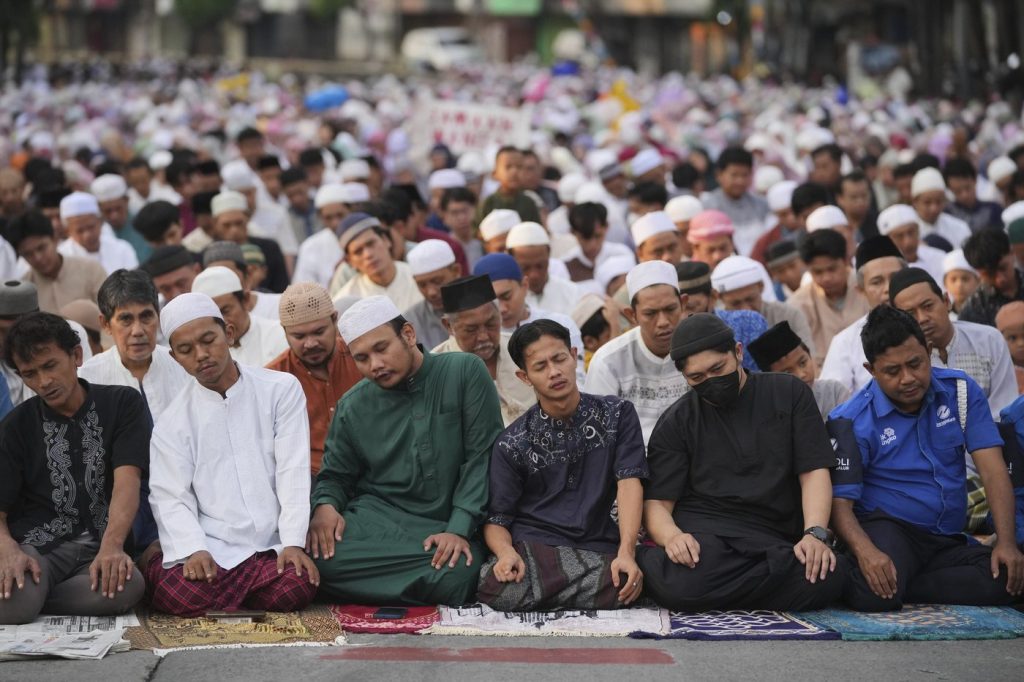JAKARTA, Indonesia (AP) - The mood surrounding the Muslim holiday of Eid al-Adha has been notably subdued this year across various parts of the world, attributed to reduced spending, increasing prices, and a decline in animal sacrifices. In Jakarta, Indonesia's capital, hundreds of Muslim worshippers gathered shoulder-to-shoulder in the streets, with the Istiqlal Grand Mosque filled for morning prayers on Friday.
Eid al-Adha, known as the "Feast of Sacrifice," coincides with the concluding rites of the annual Hajj in Saudi Arabia. This occasion is typically marked by joyous celebrations, central to which is the tradition of food, where devout Muslims engage in the buying and slaughtering of animals, sharing two-thirds of the meat with the less fortunate.
At the Jonggol Cattle Market outside Jakarta, activity abounded as cattle traders sought to sell sacrificial animals. However, despite some increase in sales ahead of Eid, many sellers reported losing customers due to economic hardships exacerbated by the COVID-19 pandemic. An outbreak of foot-and-mouth disease from 2022 to 2023 significantly impacted the holiday trade in goats, cows, and sheep, prompting the Indonesian government to take measures to stabilize the situation.
Rahmat Debleng, a seller at the market, shared that previously, he would sell more than 100 cows in the two weeks leading up to Eid al-Adha. Yet, this year, he sold only 43 cows by the eve of the celebration, leaving six in his stall. He attributed the diminished sales primarily to ongoing economic challenges rather than the lingering threat of foot-and-mouth disease.
According to data from the Jakarta city administration, the number of available sacrificial animals this year was recorded at 35,133, marking a 57% decline compared to the previous year. As part of efforts to boost family time during the festivities, the government has declared the following Monday an additional holiday following Friday’s celebration. Analysts predict that the momentum from Eid will support economic growth in Indonesia, where household consumption has historically contributed over 50% to the GDP. However, expectations of subdued consumer spending persist for 2025.
In South Asia, countries such as India and Bangladesh are set to celebrate Eid al-Adha on Saturday. As the festival approaches, many Muslims in these regions are actively participating in livestock markets to purchase and sell millions of animals designated for sacrifice. In New Delhi, market activity is high, with vendors engaging potential buyers in price negotiations for animals. Mohammad Ali Qureshi, a seller, noted that his goats this year are being sold for as much as $640, reflecting a price increase of approximately $60 from the previous year.
Preparations for Eid are also gaining momentum in Indian-controlled Kashmir, where the tradition of dyeing sheep and goats with henna prior to sacrifice remains strong. Riyaz Wani, a resident of Kashmir's main city of Srinagar, expressed adherence to the traditions of Prophet Ibrahim, as his family adorned a sheep they plan to sacrifice with henna.
The divergence in celebration sentiments between regions underscores a larger narrative of economic fluctuation impacting traditional practices. Despite the challenges faced this year, the observance of Eid al-Adha continues to reflect deep-rooted faith and customs among Muslims globally.











